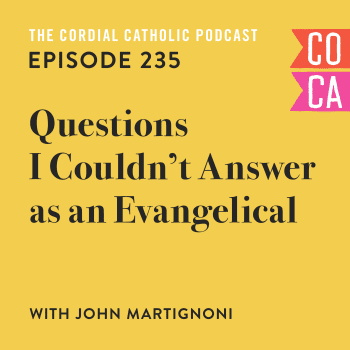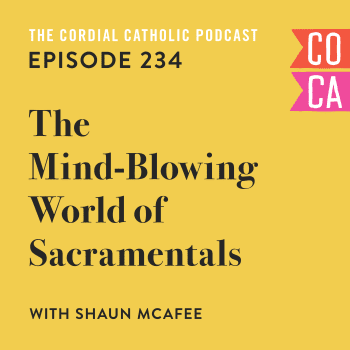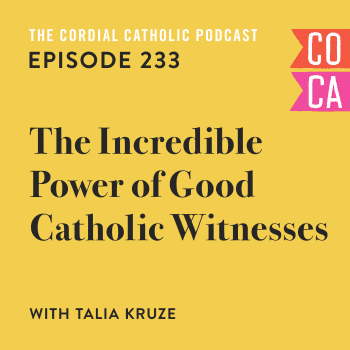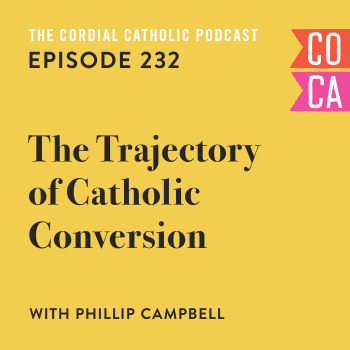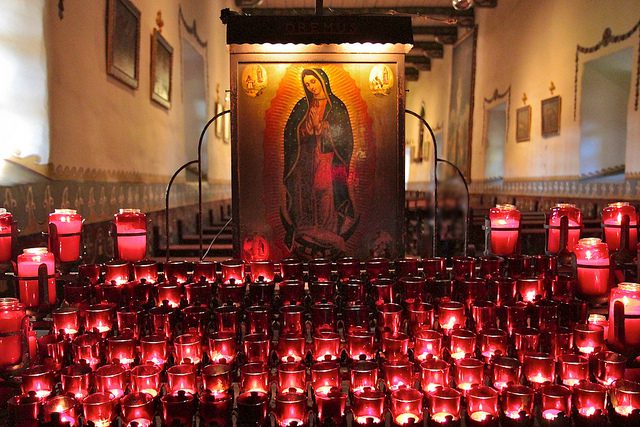
I’m a Catholic, but I didn’t begin as one.
I began my faith journey at the age of fifteen when, with the help of a good friend, I decided to become a Christian; an Evangelical Protestant, although I didn’t know the particular brand name at the time. And I meant well. I found a local Pentecostal church populated by a group of devout young Christian who welcomed me unequivocally. We were a motley crew. I fit right in.
Then in university, at a time when so many Christians lose their faith and their identity, I plugged into an incredible campus ministry. There I met lifelong friends, grew a great deal both emotionally and spiritually, and met my beautiful wife. (It was evident, she’d say, that I still had a lot of maturing to do.)
But the trajectory of my faith life would take a subtle but noticeably fork in the road one day when an Evangelical pastor asked me what’s more important, the Bible or tradition.
I didn’t have an answer, and that stumped me.
And when I dug for answers, I was even more stumped, and unsatisfied. This began a long journey of searching, prayer, and unexpected discoveries.
A journey which culminated at Easter, two years ago, when I entered full communion with the Roman Catholic Church.
When that Evangelical pastor asked me about the Bible and tradition I knew very little about either, as it turns out, and my research eventually led me to look into Catholicism and its historical claims.
What I thought I knew about Catholics, as an Evangelical, was a lot.
Turns out I was wrong about almost everything.
I’m became Catholic because of what I’ve learned.
St. Francis de Sales is a favourite saint of mine. In the 16th century, as the Reformation split apart the Christian Church in Europe he wrote, preached, and worked tirelessly to explain the Catholic faith, and bring Protestants back into the fold.
He was incredibly successful and something in his mission of cordially explaining his faith resonates deeply with me.
To paraphrase St. Francis de Sales to the early Protestants: If you’d known what the Catholic Church really taught you’d never have left.
In my case, if I’d known what the Catholic Church really taught I’d have become Catholic a long, long time ago.
Catholics Don’t Worship Mary
The Catholic Church doesn’t teach the worship of Mary. Worship (and adoration) are for God alone.
As an Evangelical I thought that Catholics worshipped Mary alongside her son, Jesus. There are plenty of churches named in her honour, Catholics seemed obsessed with statues of the Virgin, and the Rosary, of all things, seemed to be nothing more than vain repetition and worship directed towards Jesus’s mother.
The reality, I’ve learned, is much different.
Catholics don’t worship Mary but, because of her special role in salvation history, she is venerated. How is that different? In Catholic theology, which, remember, was the theology of the whole Christian Church for 1,500 years, we ask Mary to pray for us.
Like Mary’s request to Jesus at the wedding at Cana, Catholics believe that Mary has the ear of Jesus in a special way. This is also reflected in biblical typology—the same kind of exegesis that Jesus used to explain His role in salvation to the apostles on the road to Emmaus. In the same way I can ask my best friend—a living, breathing Christian—to pray for my intentions, the Catholic Church teaches that Mary can be asked for prayer in the same way.
When Catholics say they pray, “to Mary,” they don’t mean that Mary will answer our prayers. This understanding of “pray” is more a difficulty of the English language.
When we “pray to” Mary, we ask for her to pray for us, to Christ.
Jesus answers all prayers. We ask Mary to pray on our behalf.
Catholics Don’t Worship the Saints
In the same way, the Catholic Church believes that holy men and women (more women than men, for the record) are, presently, in the presence of God.
We call these people saints and, like the Virgin Mary, we can ask for their prayers.
As pictured in Revelation, the prayers of the saints gathered around the altar float up like incense before God. That’s why, since the very beginning of the Christian Church, there has been a strong belief in ability of the dead to pray for us—and the practice of us asking them for their prayers.
This is why the earliest Christian Churches were built on sites where holy men and women were martyred like the churches honouring Saint Peter and Saint Paul in Rome.
The beautiful theology of the Catholic Church says that the Church, as a body of believers, is made up of all past, present, and future Christians. We’re all one and the same and just because I pass away doesn’t mean I cease to be a part of that active body. Jesus conquered death as so does His Church.
The saints, as Christians, continue their role in the body, only now in the presence of God.
Jesus is Present in the Eucharist
For all the different branches and denominations of Protestantism I’ve learned that no one takes Jesus’s words more seriously than the Catholic Church.
When Jesus said, “This is my body; this is my blood,” the Catholic Church—and the whole of Christianity for 1,500 years—takes Him at His word.
Incredibly, the Catholic theology of transubstantiation says that when the priest consecrates the elements (the bread and the wine) they become the actual body and blood of Jesus through a mysterious, miraculous process. The fact that we can’t see, touch, or taste these elements are real flesh and blood is part of the miracle.
This bold claim is backed up not only by a thousand and a half years of Church history but by solid exegesis of the gospels.
Jesus, from Bethlehem (which means “the house of bread”), who was laid into a manger (which is a feeding trough) when He was born is the actual manna from Heaven.
If I had known that I can actually receive Jesus in the Eucharist I would’ve stormed the doors of my local Catholic Church a decade ago.
There’s Only One Mass
What strikes me as even more incredible is the Catholic theology of the act of the Eucharist itself: There’s only one.
Jesus’s sacrifice on the cross was once and for all, final, and this is something that all Protestants can get behind. The brilliant, beauty of the Mass and the Real Presence of Jesus in the Eucharistic elements, however, is that it links us up with all of Christian history—past, present, and future.
Jesus only died once.
When the priest prayers the Eucharistic Prayers and says, “This is my body; this is my blood,” we are, as a church community, reliving the Last Supper and Jesus’s death on the cross.
We are linking up, together, with all of the other Christians who have ever, and will ever, celebrate the Eucharist.
And we’re linking up with the saints, angels, the Virgin Mary, and God Himself in Heaven as we see this same celebration taking place in Revelation.
As a Catholic, then, when I go to Mass I am experiencing something universal: Jesus’s death re-presented before my eyes.
A genuine tearing of the veil which allows us modern Catholics to reach back into the very time of the very Last Supper itself.
The Priest Acts as Jesus
In a similar way, I never understood the importance of the priest in Catholic theology. As a young Evangelical the priest, like Mary and the saints, seemed to stand in the way of my personal relationship with Jesus.
But I had it all wrong.
The priest, as understood by Catholic theology, acts as Christ. The priest is a stand-in, if you will.
In the Mass, the priests acts in the place of Jesus, as he consecrates the bread and the wine. In the blessing of people, in Baptism, in prayer, and in the healing of the sick the priest, based on the authority that Jesus gives His apostles in the New Testament, is acting in His place.
Where Jesus is not tangibly, physically with us, the priest is here in His place.
In confession, the priest, based on the direct charge from Jesus, “whoever’s sins you forgive they are forgiven,” represents Christ in forgiving our sins for us.
We don’t have to imagine God among us: there He is.
And His presence is an incredible blessing and grace.
God Gave Us a Real, Tangible Church
Perhaps the greatest, most incredible thing I’ve learned, and wish that I knew a long, long time ago, is that Jesus left us with a real, tangible Church.
As an Evangelical, I thought of the Church as a non-physical, spiritual union of Christians all over the world. But this isn’t how Jesus meant it, I’m convinced.
Because this isn’t the Church as conceived by the apostles, the fathers of the Church (who were taught by the apostles), and all Christians for more than fifteen hundred years.
As I become Catholic perhaps the greatest gift I’m to receive is union with a real, tangible Church founded by Christ.
A Church with bishops and priests who can trace their authority, historically, all the way back to the apostles. Authority that we see manifest in the New Testament as the ability to forgive sins, drive out demons, and define an understanding of doctrine. These authoritative charges, according to the Catholic Church, remain with today’s bishops and priests through Apostolic Succession.
That’s why when the priest says, “You’re forgiven,” he means it. Because Christ said he’d have that power.
Rather than having to “feel” or “know” it on our own, God gave us the beauty and the blessing of a physical, tangible Church to be His hands and feet on earth.
I don’t need to pray and ask for God to give me a sense of His grace, although I certainly could, and do. But in the Eucharist, in confession, and in the knowledge that God gave us the Church, we can be certain of His grace. This, in my experience, has been the most powerful aspect of the Catholic Church—and something I wish I knew years ago.
The most beautiful gift that Jesus gave us, beyond His sacrificial offering, was the establishment of a Church to proclaim, celebrate, and safeguard truth.
There’s a lot—a lot!—I wish I’d known about the Catholic Church a long time ago.
And one that fateful day which set the course of my faith life in an entirely new direction I could’ve never anticipated that a question about the Bible and tradition would’ve led me here.
But here we are, and there’s nowhere I’d rather be.
In the Catholic Church I’ve found an incredible, unimaginable home. It’s miles from anything I’d ever known before and, once I learned about what Catholics really believed there’s nothing I could’ve done to avoid becoming one myself!
This article was originally published on my personal blog before the Easter Vigil, 2015.



